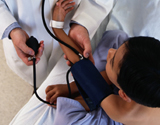
Pediatric Cardiology Overview
 At Millers Children's Hospital, we offer patients specialized care in many critical fields, including cardiac care.
At Millers Children's Hospital, we offer patients specialized care in many critical fields, including cardiac care.
Our cardiology services include the diagnosis, treatment and monitoring of congenital and acquired heart conditions of children from birth to adolescence. Our doctors are highly skilled in handling these cases to ensure that your child receives the best possible care. We understand the emotional turmoil that heart disease can create in a child and his/her family, and will do our best to alleviate your worries through expert care.
Diagnosing your child's heart condition is done in our state-of-the-art facilities with the latest and most advanced equipment. Diagnostic procedures at Millers Children's Hospital are designed to be as minimally invasive as possible without sacrificing accuracy.
We are experienced in performing routine, emergency and transplant surgeries to treat a wide range of heart conditions. Some of the heart conditions we treat include:
- Anemia
- Atrial Septal Defect
- Congenital Heart Defects
- Heart Murmurs
- Hemophilia
- High Blood Pressure
- Kawasaki Disease
- Mitral Valve Prolapse
- Port-Wine Stains
- Sickle Cell Disease
- Ventricular Septal Defect
To learn more about our cardiac services and to speak with one of our experienced doctors, please call us today to schedule an appointment.
Congenital Heart Defects
A congenital heart defect is a structural abnormality within the heart that can cause problems with functioning. Congenital heart defects are the most common type of birth defect, and affect thousands of Americans each year. Most cases of heart disease found in children are the result of a congenital heart defect. Although the cause of these defects is not known for certain, it is presumed to be genetic, as several genes have been discovered that are linked to the presence of a heart defect.
Some of the most common congenital heart defects include:
- Aortic stenosis
- Atrial septal defect
- Atrioventricular canal defect
- Patent ductus arteriosus
- Pulmonary stenosis
- Tricuspid atresia
Most of these conditions involve narrowed heart valves that make it difficult for blood to pass through, or a hole in the heart that causes oxygen-rich and oxygen-poor blood to mix.
Many congenital heart defects do not require any treatment unless complications arise. For those that do, surgery or catheter procedures may be performed to repair the defect and relieve symptoms. These procedures vary depending on the type and severity of the child's condition, but are usually successful. Some patients may require multiple treatments to correct their condition.
Children born with congenital heart defects often need special care throughout their lives. It is important to keep your child educated about his/her condition and to help them cope with the physical and emotional effects associated with the condition. Most children with congenital heart defects develop normally and can enjoy a high quality of life with no major complications.
Hypertension
 While high blood pressure, also known as hypertension, is most common among adults, this condition can also affect children of any age. High blood pressure in children is becoming more and more prevalent, and is most likely linked to an increase in childhood obesity. In younger children, the condition may be caused by premature birth or problems within the kidneys or heart.
While high blood pressure, also known as hypertension, is most common among adults, this condition can also affect children of any age. High blood pressure in children is becoming more and more prevalent, and is most likely linked to an increase in childhood obesity. In younger children, the condition may be caused by premature birth or problems within the kidneys or heart.
High blood pressure places more pressure on the heart and arteries as they pump blood through the body. Our blood pressure changes from minute to minute, and may be affected by physical activity, body temperature, diet, emotional state and any medications being taken. Over time, high blood pressure can cause damage to the heart, brain, kidneys and eyes. It is important to diagnose and treat high blood pressure as early as possible to help minimize these effects.
Treatment for hypertension depends on the cause of the condition. Many cases can be relieved by treating the underlying condition that is causing high blood pressure as well. Other cases can be relieved through lifestyle changes such as weight loss and eating fruits and vegetables. Medication is not usually prescribed for high blood pressure in children, unless lifestyle changes do not help to improve the condition. You can help your child manage his/her high blood pressure by helping them practice a healthy and active lifestyle and keeping stress at a minimum.
Heart Murmur
 A heart murmur is a common childhood condition that may cause concern for parents, but is in fact usually a harmless condition that does not affect your child's health. This condition is described as an extra sound in addition to the sound of a normal heartbeat. Many children will have a heart murmur at some point in their lives, which may be caused simply by normal blood flow.
A heart murmur is a common childhood condition that may cause concern for parents, but is in fact usually a harmless condition that does not affect your child's health. This condition is described as an extra sound in addition to the sound of a normal heartbeat. Many children will have a heart murmur at some point in their lives, which may be caused simply by normal blood flow.
When a heart murmur is diagnosed, it is rated on a scale from one to six, depending on the intensity or loudness of the condition. Most murmurs are classified as functional or innocent, meaning they are produced by a healthy heart and should not be cause for concern. Other, more serious murmurs may be caused by a congenital heart defect, such as a hole in the heart or a defective heart valve.
Children with a heart murmur that may be linked to a serious heart condition often experience:
- Rapid breathing
- Blueish tint on the lips
- Fatigue
- Difficulty feeding
- Chest pain
Most heart murmurs go away on their own without affecting your child's quality of life. More serious murmurs can be relieved by treating the underlying heart condition. The murmur itself is considered to be a symptom of another condition, and does not need to be treated specifically. It is important to monitor heart murmurs to ensure that they are not caused by a more serious condition and do not interfere with your child's everyday life.


